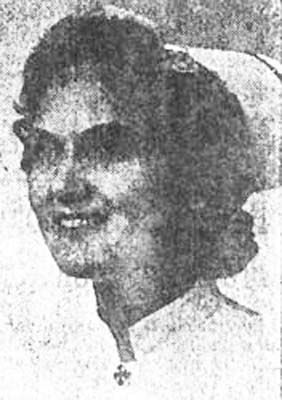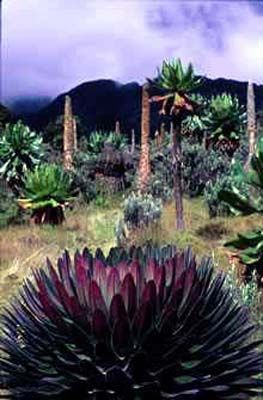 |
(2nd daughter of Hardy & Beatrice Owen Rossier)
Born: April 11, 1924
Martha finished high school and went into the Marine Corps. She became a nurse and in 1958,
went to Africa to work in a Mission Hospital. Martha helped establish an orphanage, giving
most of her life to the needs of Africa. She is now retired and lives with her sister, Joyce,
in Canandaigua, New York.

Copied from Union Springs newspaper
Two Years ago this month, Miss Martha Rossier, a resident of Union Springs, and nurse
in the Auburn Memorial Hospital, left to take up nursing duties in Uganda, East Africa,
where the Seventh-day Adventists operate a mission hospital.
In a recent letter to her mother, Mrs. Beatrice Rossier of Union Springs, Miss Rossier
remembers her many friends and acquaintances of this area and tells something of the
intriguing life of East Africa.
The mission hospital is located in Ankole, a district in Uganda. This British Protectorate,
although a small country, plays a very important part in the vast continent of Africa. Here,
where the first trickles of the great Nile River are found, are also located the headwaters
of the second largest lake in the world, Lake Victoria, as well as many other important
lake ports which connect East Africa with Central and South Africa, and thus the outside world.
In Uganda a large percentage of Africa's coffee and cotton is grown. There are large copper
reserves in the foothills of the Ruwenzori Mts. which border on the Belgium Congo
and tower to 19,000 feet (which is higher than the Alps). This mountain range is just forty miles
from the hospital, and on clear mornings the glistening perpetual snow on its peaks can be
seen from the back yard of the hospital.
"These are Africa's mysterious Mountains of the Moon. In the luxuriant tropical forests
at their feet live dwindling tribes of Pygmies still untouched by civilization, as well as
other primitive tribes little known to the white man. Here also remain the well-known
beats of the African forest, lion, leopard, gorilla, elephant and hippos in the watered
areas."
"The people of Ankola are friendly, responsive, and very needy. Just a few years ago
they were still dressed in animal skins and the children were not dressed at all."
Now they are proud of their colorful garments, and those who have been able to go to
school and learn civilized ways, will make every effort to buy a pair of shoes, which
seems to be a badge of distinction.
Communication between the different parts of Uganda are made very difficult by the
numerous tribes and languages used. For the most part these different tribes are
friendly toward each other, but very jealously cling to their own customs and languages, preferring
to remain independent of each other. This makes work much more difficult and progress is
slow because the languages and customs of the people must be learned before effective
missionary work can be carried out.
Miss Rossier states that the Seventh-day Adventist Hospital is the only one in the
district although there is a government hospital forty miles away. These are the only
hospitals in Ankole, where 250,000 people are plagued by the life-taking diseases of the
tropics. Two years ago the hospital there had 40 beds, and many of the patients used their own
mats on the floor. Today there are 75 beds, and several additional trained African medical
workers. In addition, about 8 or 10 other employees help them with non-professional work.
These helpers have a meager education, usually from three to six grades. Trying to carry on
a hospital program with such a staff proves to be at times pathetic - at times humorous.
Miss Rossier ends her letter with a message to her friends and acquaintances of Union
Springs and Auburn: "You have been in my thoughts many times since I have been in Africa,
and I have wanted to send you greetings much more often than you have received them. The
days are full and speed by quickly; there hardly seems to be time for writing about what we
are doing - we are so busy with the doing."




|



|